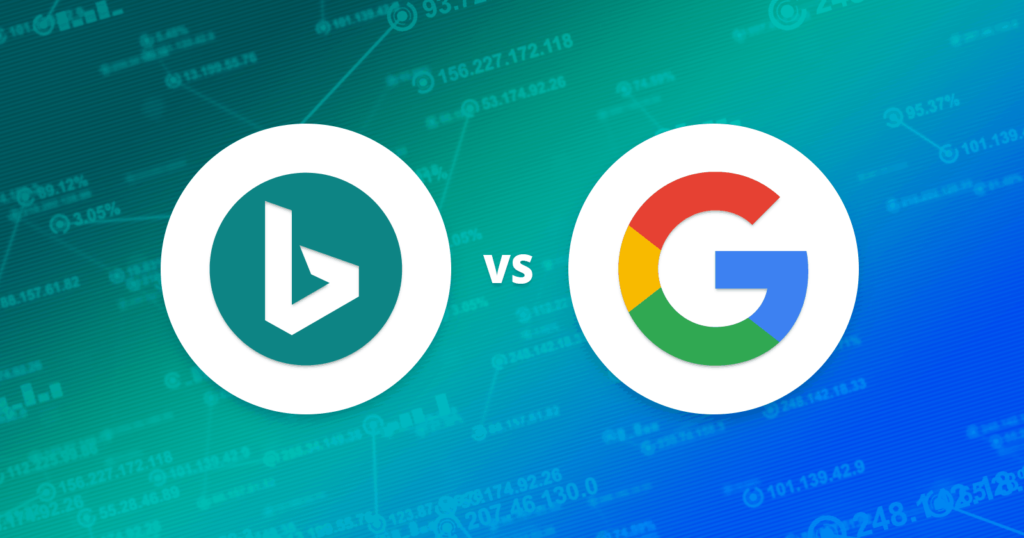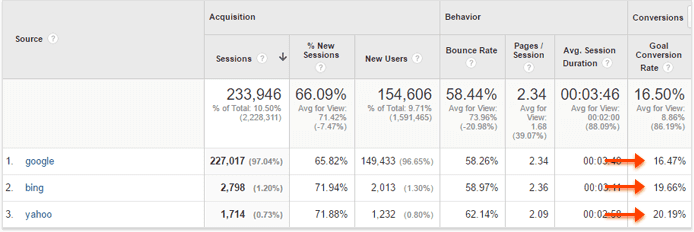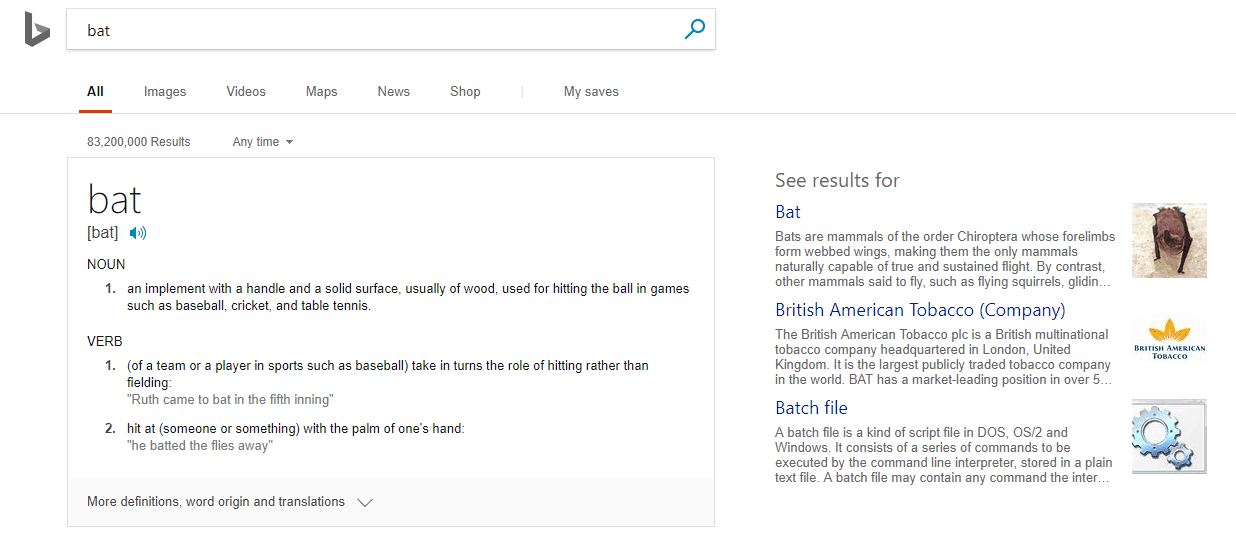Bing SEO vs. Google SEO: 5 Major Differences

Bing might be your business’s biggest untapped opportunity if you, like so many others, forgot that there are search engines other than Google.
Bing and Yahoo (which has been powered by Bing since 2010) together dominate 33.6 percent of the desktop search engine market share in the U.S. In certain industries, that number’s even higher: Bing and Yahoo process almost 80 percent of all searches related to education, automotive, and telecommunications, for example.
And, most importantly, many marketers have noted that Bing traffic converts better than Google traffic — which might have something to do with Bing’s average demographic being more mature and arguably having more money to spend.

The good news is that if you’ve already invested in Google SEO, then you’re just a hop, skip, and a jump away from seeing tangible results on other search engines as well. That’s because Bing and Google share many of the same ranking signals, but there are also key differences which we’ll examine in this article.
1. Keywords
One of the biggest differences between Bing and Google has to do with keywords.
On the one hand, Google’s working hard to improve search accuracy by understanding searcher intent and interpreting contextual cues from different websites. We call this semantic search, which in part relies on machine learning and artificial intelligence (such as RankBrain) to help them understand a page’s content.
Google has said that RankBrain is the third most important factor in their ranking algorithm — which means that exact match keywords don’t matter nearly as much as creating comprehensive topical pages and articles for your visitors.
On the other hand, Bing’s a little rusty when it comes to broad-matching keywords, and their Webmaster Guidelines actually advise you to “use targeted keywords whenever possible.” You’ll find you rank better in Bing SERPs if you use exact keywords wherever you can, including your domain, your meta descriptions, and your H1 and H2 title tags.
Another difference is that Google uses contextual clues in your query to figure out what you’re searching for, whereas Bing preferentially shows your local results first. If the word you’re searching for has multiple meaning, Bing will also provide other options in the sidebar to help them understand your query.

Google: Create comprehensive pages backed by keyword research, but focus on topical relevance instead of exact match keywords.
Bing: Use straightforward keywords that exactly match the terms you’re targeting in Bing’s search results—just don’t over-optimize or you risk running afoul of Penguin.
2. Meta Keywords
While we’re on the subject of keywords, let’s address the elephant in the room: as far as Google is concerned, meta keywords are dead. Google said way back in 2009 that “many years ago Google began disregarding the keywords meta tag,” and you don’t have to search hard to find articles about why you shouldn’t use meta keywords.
However, over on Bing, meta keywords are alive and kicking. Levy Online, a digital agency, posted this recent real-world example:
“A client came to us with good Google ranks, but very poor Yahoo and Bing. One of the first things we noticed was the lack of meta keywords and descriptions. Once we completed filling these out, we saw noticeable increases across the SERPs.“
Naturally, this doesn’t give you an excuse to abuse them or to start stuffing irrelevant keywords into the meta tag, but it does mean you shouldn’t neglect them entirely. While meta keywords might be largely irrelevant when it comes to Google, they have a huge impact on Bing results.
Google: Meta keyword tag isn’t a ranking signal.
Bing: Meta descriptions and keywords can (potentially) have a big impact on search ranking.
3. Backlinks
Both Google and Bing are big on trust. They both value backlinks, for example, because these are signs that visitors found your content useful, trust the information you’ve provided, and now want to share it with others.
Google gauges trust by measuring the PageRank (the link equity flowing through backlinks) of domains linking to your content. High-PageRank links are weighted heavily, and a few of those are worth way more than hundreds of spammy, low-PageRank links.
Bing also values high-quality links, but they judge quality slightly differently. For example, Bing places more emphasis on domain age and certain domain extensions. From Bing’s POV, you’re the hottest thing since sliced bread if you earn lots of organic backlinks with well-established domains, especially if those domains end with .gov, .edu, and .org extensions.
Bing also places slightly more emphasis on the number of links you receive. However, as with Google, you should avoid unscrupulous link building. I’d caution you to build no more than 20 links per month and to try to focus on quality over quantity.
Google: Authoritative backlinks and high-quality content are the most important indicators of a page’s authority when it comes to backlinks.
Bing: Link count is weighted more heavily, and factors such as domain age and .gov, .edu, and .org domain extensions are considered trust signals.
4. Social Signals
Google has long denied that social signals play a special role in page ranking, despite a lot of speculation that it plays some small role.
Bing, on the other hand, is very open about the importance of social signals:
“Social media plays a role in today’s effort to rank well in search results. The most obvious part it plays is via influence. If you are influential socially, this leads to your followers sharing your information widely, which in turn results in Bing seeing these positive signals. These positive signals can have an impact on how you rank organically in the long run.“
If you want to rank well on Bing, then you’re going to need to keep an ear to the ground in your social media circles. Engage with your audience and earn as many tweets, shares, likes, and +1s as possible.
Baking social media into your SEO strategy is time-consuming, but well worth it if you want to optimize for Bing. Consider downloading a comprehensive social media listening tool that will help you find and tap into every conversation people are having about your business on the web.
Google: Treats Facebook and Twitter pages like any other indexed pages.
Bing: Social signals are a key ranking factor. Search results will show you your Facebook friends’ and Twitter followers’ ratings of different businesses.
5. Multimedia Content
Bing’s been pushing the envelope when it comes to visual search, which goes hand-in-hand with one of their most touted features — “entity understanding.”
Essentially, Bing has the ability to accurately crawl and understand various types of multimedia content, such as video, audio, and images. Bing can also crawl and understand Flash websites.
Meanwhile, Google still relies most heavily on text-based content, and Flash websites are all but invisible to them. High-quality images and videos do matter, but they aren’t weighted nearly as heavily.
While I wouldn’t advise you run out and build a Flash website, beefing up your content with more images, videos, and audio files could give you a leg up on your competition.
Google: Emphasizes text-based content and can’t crawl Flash websites.
Bing: More emphasis on multimedia content and is able to crawl and understand Flash websites.
Other Technical SEO Differences
While the five differences listed above are probably the biggest differences separating Google and Bing, there are still some other small discrepancies that I should note.
For example, while you can generally rely on Google to index your website and trust that it will try to crawl and index every page of your site, Bing tends to focus on key pages and crawls your pages more infrequently.
Fortunately, you can help this process along by submitting your site to Bing for indexing and then increasing your crawl rate by using your Bing Webmaster Toolsand clicking Crawl Control. You can also submit your sitemap to Bing by clicking Submit a Sitemap in your Webmaster Tools or by including a path to it in your robots.txt—an important step, given that this is a ranking signal.
For more examples of technical factors that differ from Google, check out Bing’s Webmaster Guidelines.
More Bing SEO Resources Here:
- How to Build Links for Bing vs. Google
- Bing Upgrades Visual Search With Object Detection Technology
- Links to Decrease in Importance, Says Bing
